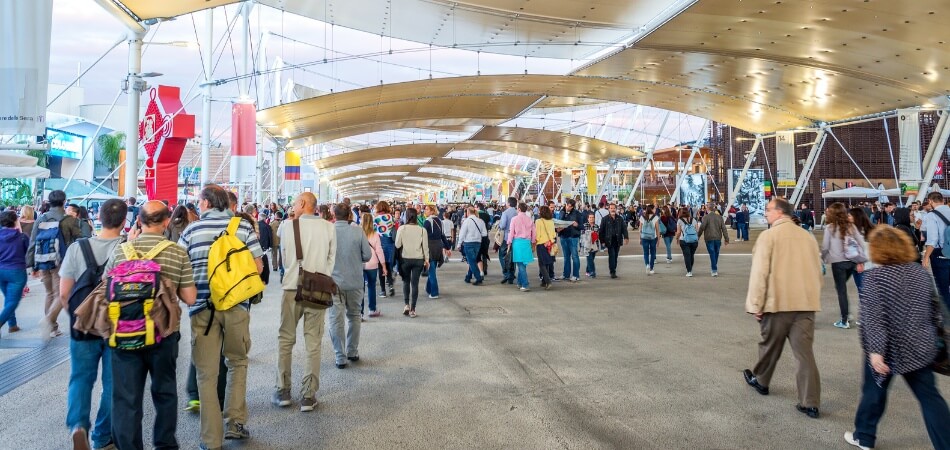Engaging with industry peers and discovering the latest innovations are vital in driving business growth. An Expo offers this unique opportunity. But how does an Expo work?
At its core, Expos are events where companies and organizations within a specific industry or niche converge. Their primary objective is to present their newest products, services, and developments to a curious audience.
Initially, organizers plan the event, determining the venue, participants, and schedule. Participating entities then prepare their booths, presentations, and materials designed to entice and educate attendees.
Visitors are introduced to various industry advancements and offerings, fostering connections, collaborations, and potential business deals. This structured yet dynamic setting makes Expos a pivotal moment for industries to evolve and flourish.
A Brief Overview of Expo History
Expos, often hailed as grand showcases of innovation, have marked human history with their captivating blend of culture and commerce. They offer a window into technological advancements, artistic flair, and global connections. Through the ages, Expos have evolved, reflecting societal shifts and aspirations.

In the mid-19th century, the first World Expo in London spotlighted the era’s technological marvels, setting a precedent for global exhibitions. The Eiffel Tower, an iconic symbol of Paris, was initially introduced during the 1889 World’s Fair. Such events highlighted national prowess and fostered international collaboration, making them sought-after gatherings.
Throughout the 20th and early 21st centuries, Expos transformed to emphasize sustainability, technology, and global unity themes. Pavilions became platforms for countries to address pressing global challenges and share solutions. The fusion of technology, art, and culture rendered these events not just trade fairs but global festivals celebrating human ingenuity.
How Does an Expo Work?
At its heart, an Expo is a grand stage for innovation, business, and culture. It’s where ideas converge, industries showcase their finest, and collaborations are born. Diving deeper, the workings of an Expo unfold in distinct phases.
Organizers initiate the process by selecting a suitable venue and setting event objectives. They then reach out to potential exhibitors, offering space to showcase products or services. These preparatory steps ensure a well-structured and engaging event for attendees.
Upon confirmation, exhibitors invest time in designing their booths and presentations. These spaces are meticulously crafted to captivate visitors, display products effectively, and foster networking opportunities. The ambiance, therefore, becomes an intricate dance of design, information, and engagement.
When the day arrives, attendees explore the Expo, moving from booth to booth. They encounter the latest industry trends, discuss, and even strike potential business deals. Thus, an Expo acts as a catalyst for innovation, collaboration, and growth.
Different Types of Expo Events
With their diverse flavors, Expo events create spaces where industries shine, innovations emerge, and collaborations begin. They aren’t just one-dimensional; their types vary as widely as their purposes. Below, we explore some predominant forms these gatherings take.

Trade Expos:
Focusing primarily on businesses, trade expos facilitate showcasing new products to potential buyers and industry peers. Exhibitors get direct feedback, while attendees gain insights into the latest market offerings. It’s a hub for B2B networking and collaboration.
Consumer Expos:
These are directly aimed at the general public, offering a platform for companies to introduce products or services. Visitors get firsthand experience, often enjoying promotional prices or exclusive previews. It’s a hotspot for direct consumer engagement.
Industry-Specific Expos:
Tailored for specific sectors, these expos dive deep into niche markets. These gatherings illuminate industry trends, challenges, and solutions from tech to textiles. It’s an environment where specialized knowledge meets market demands.
Educational Expos:
Primarily centered around academia and learning tools, educational expos introduce advancements in teaching methods, materials, and technologies. Institutions, educators, and students benefit from exchanging ideas and resources. It’s a nexus where education meets innovation.
Cultural Expos:
These events celebrate the rich tapestry of global cultures, traditions, and arts. They provide a platform for countries or communities to showcase their heritage, food, and crafts. It’s a journey of global discovery in one venue.
Startup Expos:
Emerging businesses and entrepreneurs come to the fore in these vibrant events. They present their innovative ideas, seek investors, and network with industry professionals. It’s a springboard for new businesses aiming for growth.
In essence, Expo events, in their varied forms, serve as melting pots of ideas, platforms for growth, and gateways to new horizons. Whether it’s to foster business connections, discover new products, or immerse in a cultural experience, there’s an Expo tailored to suit every interest.
The Kinds of People Attend Expo Events
Expo events, with their vibrant atmospheres, attract a diverse array of attendees, each bringing a unique perspective and purpose. From seasoned professionals to curious consumers, these gatherings buzz with a myriad of personalities. Let’s delve into the types of individuals who grace these events.
Business Professionals:
These attendees seek networking opportunities, partnerships, and market insights. Expos offer them a platform to expand their business horizons and forge meaningful collaborations. Their presence drives the B2B component of expos.
End Consumers:
Curious about the latest products or services, these visitors wish to experience offerings firsthand. They explore, engage, and even purchase during these events. Expos for them are vast marketplaces of discovery.
Investors and Venture Capitalists:
On the hunt for promising ventures and groundbreaking ideas, these individuals scout for investment opportunities. They evaluate potential, meet entrepreneurs, and initiate funding conversations. Their participation can shape a startup’s future trajectory.
Navigating through an Expo, one witnesses a dynamic blend of aspirations, expertise, and enthusiasm. The confluence of such diverse attendees ensures that these events remain hubs of innovation, commerce, and collaboration.
How Does an Expo Event Benefit its Attendees?
Expo events, a tapestry of innovation and collaboration, are designed to offer value to each visitor. From business magnates to everyday consumers, the benefits reaped from these gatherings are manifold. Let’s explore how attendees gain from their participation in such events.

Networking Opportunities:
Attendees meet professionals from various backgrounds, fostering diverse connections. Networking at expos can lead to potential partnerships or collaborations. Such relationships often drive business growth and innovation.
Market Insight:
These events showcase the latest industry trends, products, and technologies. Visitors gain a comprehensive understanding of current market dynamics. This knowledge aids in strategic decision-making and future planning.
Learning and Development:
Seminars, workshops, and presentations form an integral part of expos. These platforms impart knowledge, teach new skills, and inspire innovation. Attendees leave enriched and better informed.
Direct Access to Suppliers:
Expos allow attendees to meet suppliers face-to-face. Such interactions enable better negotiation, understanding of products, and establishment of trust. Direct engagement often leads to better business terms and partnerships.
Product Demonstrations:
Before investing, attendees can witness live product demos. This hands-on approach clarifies doubts, showcases features, and enhances the buyer’s confidence. It often influences purchasing decisions in the exhibitor’s favor.
Brand Awareness:
For businesses, expos are platforms to reinforce brand presence. Engaging booths, product displays, and interactive sessions leave lasting impressions. Such brand visibility can translate into increased customer loyalty and recognition.
Inspiration and Ideas:
The blend of cultures, technologies, and innovations sparks creativity. Attendees absorb diverse perspectives, inspiring fresh ideas for their ventures. Such exposure often acts as a catalyst for change and innovation.
In sum, expo events are not merely about display booths and flashy presentations. They are epicenters of knowledge, collaboration, and growth, offering attendees an enriching experience that extends well beyond the confines of the event venue.
End Notes
Navigating the intricate tapestry of an Expo event reveals its transformative power in uniting industries, fostering innovation, and cultivating growth.
Expos are more than mere events; they’re dynamic ecosystems of knowledge and collaboration. Reflecting on “how does an Expo work?” we recognize it as a symphony of planning, participation, and presentation, shaped by the myriad of attendees and exhibitors.
These gatherings have been historical progress markers, continuously evolving to mirror societal aspirations. Whether for business expansion, cultural exchange, or individual enrichment, Expos offer unparalleled opportunities.
In essence, understanding the workings of an Expo provides a lens to appreciate the confluence of commerce, culture, and collaboration in today’s interconnected world.


